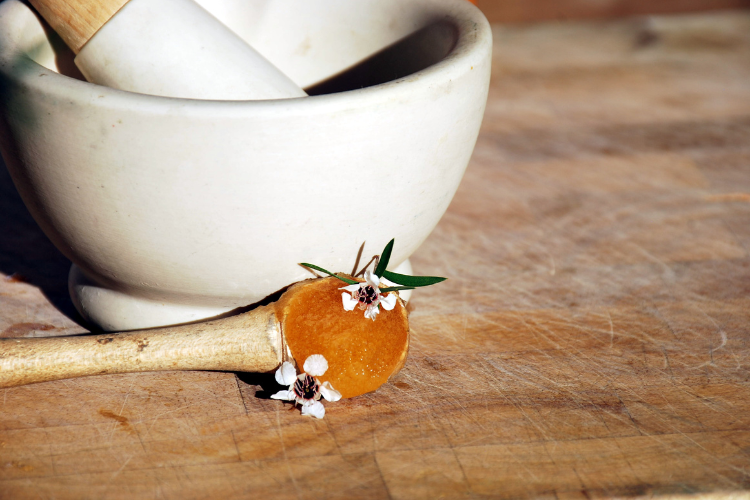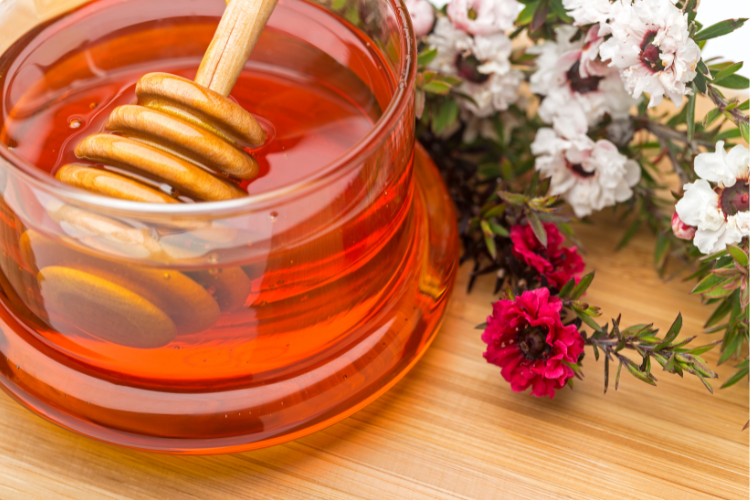Blog
Manuka Honey, Why It’s Worth the Buzz?
Manuka honey has taken the wellness world by storm, and for good reason. Touted as one of the most powerful natural remedies on the planet, this golden nectar offers an array of health benefits that set it apart from regular honey. From boosting immunity to healing wounds, manuka honey has earned its place in the spotlight. But what exactly makes it so special? In this in-depth guide, we’ll cover everything you need to know about manuka honey, including its origins, benefits, how it’s used, and why it’s worth adding to your pantry.
1. What is Manuka Honey?
Manuka honey is produced by bees that pollinate the flowers of the manuka tree (Leptospermum scoparium), a native species found primarily in New Zealand and parts of Australia. What sets manuka honey apart from traditional honey is its unique antibacterial properties, which are more potent than those found in other types of honey. The active ingredient in manuka honey responsible for these properties is methylglyoxal (MGO), a compound that can only be found in significant quantities in manuka honey.
The higher the concentration of MGO, the stronger the antibacterial properties of the honey. Manuka honey’s antibacterial activity is measured by its UMF (Unique Manuka Factor), a quality trademark that ranges from UMF 5+ to UMF 20+ or higher. The higher the UMF rating, the more potent the honey’s medicinal qualities.

2. The Origins of Manuka Honey
Manuka honey is relatively new to the global market, but it has long been a staple in traditional Maori medicine. The indigenous Maori people of New Zealand have used various parts of the manuka tree for centuries to treat everything from fevers and colds to skin infections and digestive issues. While honey itself has been used medicinally for millennia, manuka honey’s exceptional healing qualities weren’t fully recognized until the late 20th century, when scientists began to study its unique properties in depth.
3. What Makes Manuka Honey So Special?
High Levels of Methylglyoxal (MGO)
This honey contains much higher concentrations of MGO than regular honey. This compound is responsible for its powerful antibacterial and antimicrobial properties, making it more effective at combating infections and promoting healing.
Hydrogen Peroxide Activity
Like other types of honey, this honey produces hydrogen peroxide, which adds to its antimicrobial effects. However, the MGO content gives it an edge, making it more effective even after the hydrogen peroxide breaks down.
Non-Peroxide Activity (NPA)
This term refers to the antibacterial activity that remains after hydrogen peroxide is neutralized. This honey’s NPA is directly linked to its UMF rating and MGO levels, which distinguishes it from other honey varieties.
Antioxidant Properties
This honey is rich in antioxidants, which help protect the body from oxidative stress and reduce inflammation. This makes it an excellent supplement for supporting overall health and wellness.
4. Top Health Benefits of Manuka Honey
Manuka honey is known for its many health benefits, both when consumed and applied topically. Here are some of the top ways it can improve your health:
Wound Healing and Skin Health
One of the most well-researched benefits is its ability to heal wounds. Thanks to its potent antibacterial properties, this honey can help prevent infection, reduce inflammation, and promote faster healing. Studies have shown that it can be particularly effective in treating burns, ulcers, and surgical wounds.
When applied to the skin, it can also help treat acne and other inflammatory skin conditions. Its ability to draw moisture to the skin makes it an excellent choice for soothing dry or irritated skin.

Boosting the Immune System
The antimicrobial properties of manuka honey make it a fantastic immune booster. Consuming a small amount of manuka honey daily can help your body fight off bacterial and viral infections, including colds, the flu, and strep throat. Its anti-inflammatory effects also help reduce the severity and duration of symptoms.
Some studies even suggest that it may help inhibit the growth of certain harmful bacteria that are resistant to antibiotics, such as Staphylococcus aureus (MRSA).
Improving Digestive Health
Manuka honey has been shown to improve digestive health by helping balance gut bacteria and reducing inflammation in the digestive tract. It may be particularly beneficial for individuals suffering from irritable bowel syndrome (IBS), gastritis, or ulcers caused by the bacterium Helicobacter pylori.
Taking it regularly can also help ease acid reflux and support healthy digestion by reducing the growth of harmful bacteria in the gut.
Sore Throat Relief
Manuka honey’s antimicrobial and anti-inflammatory properties make it an excellent natural remedy for sore throats. A spoonful can help soothe irritation, reduce swelling, and kill bacteria that may be causing the infection.
It’s even been suggested that manuka honey may be as effective as conventional cough syrups in treating upper respiratory infections and soothing persistent coughs.
Oral Health
Maintaining good oral health is another area where manuka honey can shine. Despite its sweet taste, it doesn’t contribute to tooth decay—in fact, it may help protect against it. Its antibacterial properties can help reduce plaque, prevent gum disease, and promote overall oral hygiene.
It has even been shown to reduce gingivitis and soothe mouth ulcers when applied topically.
5. How to Use Manuka Honey?
There are countless ways to incorporate manuka honey into your daily routine, whether for health, beauty, or even as a sweet treat. Here are some popular uses for manuka honey:
Topical Applications
For wound care or acne treatment, apply manuka honey directly to the affected area and cover with a bandage or dressing. Make sure to use a high-quality, medical-grade manuka honey (with a UMF of 10+ or higher) for the best results.
Manuka honey can also be used as a face mask to moisturize and cleanse the skin. Simply apply a thin layer to your face, let it sit for 15-20 minutes, and then rinse with warm water.
Immune Support
For a natural immune boost, take 1-2 teaspoons of manuka honey daily. You can eat it straight from the spoon or add it to your tea, yogurt, or smoothie. It’s a great way to ward off seasonal illnesses and keep your immune system strong.
Sore Throat Relief
To soothe a sore throat, mix 1-2 teaspoons of manuka honey with warm water or herbal tea and sip slowly. You can also take a spoonful on its own to coat the throat and reduce irritation.
Digestive Health
For digestive support, take 1 teaspoon on an empty stomach before meals. This can help soothe the digestive tract, reduce inflammation, and promote healthy gut bacteria.
In Cooking and Baking
Manuka honey’s rich flavor makes it a great addition to both sweet and savory dishes. Use it in salad dressings, marinades, or drizzle it over yogurt, oatmeal, or fruit. Just be mindful of the temperature—heating it above 104°F (40°C) may reduce some of its beneficial properties.
6. Choosing the Best Manuka Honey: What to Look For
When purchasing manuka honey, it’s important to ensure you’re getting a high-quality product. Here are a few things to look for:
UMF Rating
The UMF rating indicates the strength of the honey’s antibacterial properties. For general health and wellness, a UMF of 10+ is a good place to start. For wound care or more targeted medicinal use, look for UMF 15+ or higher.
MGO Content
Some honey is labeled with its MGO content rather than the UMF rating. MGO levels can range from 83 mg/kg (MGO 83+) to 829 mg/kg (MGO 829+). Higher MGO content corresponds to stronger antibacterial activity.
Authenticity
Always look for a product that is certified by the UMF Honey Association. This ensures that the honey has been independently tested for its purity, quality, and potency.
Raw and Unpasteurized
To get the most benefits from manuka honey, opt for raw and unpasteurized varieties. Pasteurization can destroy some of the enzymes and nutrients that give it its medicinal properties.
7. Potential Side Effects and Precautions
While manuka honey is generally safe for most people, there are a few precautions to keep in mind:
-
Allergies: If you’re allergic to bees or pollen, you may also be allergic to it. Start with a small amount to see how your body reacts.
-
Diabetes: Like all honey, it is high in sugar. People with diabetes should monitor their blood sugar levels carefully and consult a healthcare provider before incorporating it into their diet.
-
Infants: Honey should not be given to infants under one year of age due to the risk of botulism.
8. The Future of Manuka Honey
As research continues to uncover more of manuka honey’s potential health benefits, its popularity is likely to keep growing. Scientists are currently studying its effects on everything from chronic wounds to antibiotic-resistant bacteria. There is even ongoing research into its potential role in cancer treatment, though more studies are needed in this area.
Takeaway: Is Manuka Honey Worth the Hype?
Absolutely! Manuka honey’s unique antibacterial, anti-inflammatory, and antioxidant properties make it a powerful natural remedy for a wide range of health issues. Whether you’re looking to boost your immune system, improve your skin, or support digestive health, manuka honey offers a natural, versatile solution.
However, as with any supplement, it’s important to choose a high-quality product and use it appropriately. With its impressive list of benefits and increasing availability, it is well worth adding to your health and wellness routine.
So next time you’re at the store, reach for a jar of this liquid gold—it could just be the secret weapon your body needs.

 Indonesia
Indonesia
